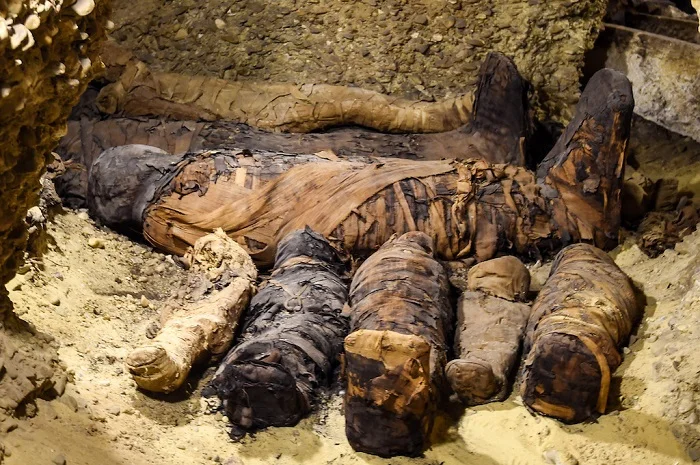Researchers in Egypt have discovered more than 40 mummies at a burial site in central Egypt dating to the Ptolemaic era, the antiquities ministry said on Saturday.
The mummies, including adults, children and animals, had been laid on the floor or in open clay coffins in a crumbling underground chamber in Minya governorate, said Antiquities Minister Khaled el-Enany.
The partially-uncovered skull of a mummy found in a burial chamber dating to the Ptolemaic era (323-30 BC) at the necropolis of Tunah Al-Gabal in Egypt's southern Minya province. (Photo: AFP/Mohamed El-Shahed)
“So far we have more than 40 mummies,” he told officials and journalists during a ceremony at the Tunah Al-Gabal site, 260 kilometres (160 miles) south of Cairo.
Archaeologist Rami Rasmi told AFP that “40 mummies were discovered, including 12 children and six animals, while the rest were adult men and women.”
This picture taken on February 2, 2019 shows newly-discovered mummies wrapped in linen found in burial chambers dating to the Ptolemaic era (323-30 BC). (Photo: AFP/Mohamed El-Shahed)
While mummification is mostly associated with ancient Egypt, the practice continued under the kingdom founded by Ptolemy, a successor to Alexander the Great, which lasted from 323 BC to 30 BC.
The Minya graves, discovered during an excavation that started in February last year, are in a communal tomb “probably belonging to a petty bourgeois family”, the ministry said.
Archaeologist Mohamed Ragab said two tombs were discovered nine metres underground and contained more than six rooms.
A Egyptian archaeologist examines a mummy in a coffin inside a tomb during the presentation of a new discovery at Tuna el-Gebel archaeological site in Minya Governorate, Egypt, Feb 2, 2019. (Photo: Reuters/Amr Abdallah Dalsh)
Shards of pottery and pieces of papyrus found at the site helped researchers to determine its date, said the head of Egypt’s Supreme Council of Antiquities Mostafa Waziri.
Ancient Greek rulers reached the height of their power between the conquests of Alexander the Great and the rise of the Roman empire.













